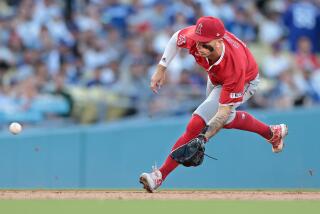Pettis Is the Hit Man as Angels Are Beaten, 6-0
- Share via
DETROIT — When Gary Pettis was traded by the Angels last year, he left behind a trail of broken bats and strikeouts that led all the way from Anaheim to Motown. Tuesday night wasn’t the first time Pettis had hurt the Angels with his hitting.
But, it was the most novel approach Pettis had tried to date.
Wearing the uniform of the Detroit Tigers and staring at a former teammate named Mike Witt, Pettis used a tactic known as the base hit to undermine the Angels in their first meeting of 1988. In fact, Pettis had two of them--driving in the Tigers’ first three runs--as Detroit defeated the Angels, 6-0, before a Tiger Stadium crowd of 11,973, a loss that dropped the Angels into a virtual last-place tie in the American League West.
To put this achievement in proper perspective, consider that Pettis drove in 17 runs during all of last season and only 4 during games in which Witt started. Overall, Pettis hit .208 and struck out 124 times in 133 games.
The Angels still remember those numbers.
“Of all people,” Angel Manager Cookie Rojas said, “Pettis beats us. You trade a guy and he comes back to beat you by driving in three runs. How can you explain it?”
Witt tried. He couldn’t.
“You’d think after watching him for four years, I’d know what he can and can’t hit,” Witt said, shaking his head while mulling over Pettis’ successive singles in the third and fifth innings.
“He hit one bad pitch . . . but the other was a good, low fastball. It’s not the pitch that strikes him out, but it’s not one he hits with authority.”
Pettis, entering the game with a .175 batting average, bounced the low fastball up the middle to score Dave Bergman and Chet Lemon in the third inning. Then, he stroked the other pitch to right field in the fifth inning to score Lemon again and start a four-run Tiger outburst.
But with the first swing alone, Pettis gave Detroit starter Jeff Robinson enough support to even his record at 2-2. Robinson limited the Angels to 6 hits as he recorded the second shutout of his major league career.
The second swing, however, spelled the beginning of the end for Witt (1-2), who failed to complete 6 innings for his second consecutive start. Witt lasted 5 innings Tuesday, yielding 6 runs on 7 hits, including four straight in the fifth inning.
And the unkindest cuts were the ones delivered by Pettis’ bat.
“He’s changed some things,” Witt allowed. “If you want to stay in the big leagues, you’ve got to change some things.
“He couldn’t have done much worse than he did last year. I’m sure they’ve worked with him here. I guess they’re trying to get him not to strike out here and put the ball in play. As long as he does that, he should be successful.”
Of course, the Angels and an entire directory of special batting instructors tried to get Pettis to do the same in Anaheim--and failed.
Sparky Anderson, the Tigers’ manager, knows this.
“I’ve seen two films of (the Angels) working with Gary--one when he was with Edmonton and one with the Angel club,” Anderson said. “The Angels worked so hard with him.
“We’re not miracle workers. They’ve got a lot of brains in Anaheim--as much brains as we’ve got here.”
But maybe Pettis never had the incentive he carries to the plate in Detroit now.
“It’s something I thought about on my way to the ballpark,” Pettis said. “I tried to tell myself not to get too excited, not to try too hard to prove to the Angels that I could still play.”
Pettis believes much of his offensive struggles can be attributed to the hand injury he tried to play with last season--a hand that underwent surgery last October.
“I think coming back from surgery and doing what I’ve done so far says something about me,” Pettis said. “I still wonder if anyone in Anaheim believed me (about the hand injury). I still don’t know.”
Pettis has said the Angels’ medical staff failed to properly diagnose the condition before it was too late, calling 1987 a wasted year.
Anderson agrees.
“He had two good years with the Angels, years when he batted above .250,” Anderson said. “He’s only had one bad one--and that’s because of a bad hand. You can throw that year out.
“To me, he’s a good player. If he hit .250 again, he’s going to steal 50 bases and catch everything hit his way. Those kind of players are hard to find. You don’t pluck ‘em off trees.”
No, you trade pitchers named Dan Petry for him. Then, you keep batting him leadoff, hoping he walks enough to make the experiment worthwhile.
And then you wait until his former team comes to town--and turn him loose against that team’s best pitcher.
“You don’t want a guy like that to beat you, exactly because of that,” Witt said. “I don’t know what was on his mind, but I was thinking about it after he drove those first two guys in.”
Pettis said he had approached Tuesday’s game, as well as this entire season, as “a personal challenge. Right now, people think of me as just a defensive ballplayer. I know I’m much more than that.”
For one night, anyway, he was. Now with his batting average lifted to .194, Pettis will try to prove it to the Angels again tonight.
Angel Notes
Who is Junior Noboa and what is he doing in Detroit?: When Brian Downing was placed on the disabled list, the Angels had to fill his spot on the roster with someone. The name Manager Cookie Rojas and General Manager Manager Mike Port settled upon was Noboa, a 23-year-old utility infielder who hit .242 in parts of two seasons with the Cleveland Indians before coming to the Angels in a March trade for minor league outfielder Ted Milner. The question put to Rojas Tuesday: Why? Rojas responded with a question of his own. “Did you see what happened Sunday?” he asked. “I had to pinch-run with a pitcher (Stewart Cliburn). We had Butch Wynegar on second base in the seventh inning, and who did I have on the bench to run for him? Bill Buckner. Can he run? Bob Boone. Can he run? I still had Gus Polidor, but if I use him to pinch-run I have no other infielder left on the bench. Noboa has speed, and with him here, it gives me a little more flexibility.” So Noboa, who batted .277 in 13 games with Edmonton, will primarily be used as a pinch-runner during his stay with the Angels. That’s also a role Chico Walker can fill--and Walker is the better hitter--but the Angels place more importance on Noboa’s superior fielding skills. “He has real good hands and he plays three positions well--second base, third base and shortstop,” Rojas said. “Having him as an extra infielder gives me more freedom.”
Add Pinch-Run: In a footrace, Cliburn would probably finish third to fellow pitchers Mike Witt and Kirk McCaskill, but Rojas cited the risk factor in his decision to use Cliburn as pinch-runner. “What happens if Witt slides in an breaks an ankle?” Rojas said. “I’d be a soggy Cookie, I’ll tell you that.”
More to Read
Go beyond the scoreboard
Get the latest on L.A.'s teams in the daily Sports Report newsletter.
You may occasionally receive promotional content from the Los Angeles Times.






